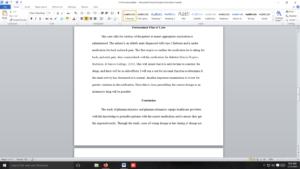principles of pharmacokinetics and pharmacodynamics
- Review the Resources for this module and consider the principles of pharmacokinetics and pharmacodynamics.
- Reflect on your experiences, observations, and/or clinical practices from the last 5 years and think about how pharmacokinetic and pharmacodynamic factors altered his or her anticipated response to a drug.
- Consider factors that might have influenced the patient’s pharmacokinetic and pharmacodynamic processes, such as genetics (including pharmacogenetics), gender, ethnicity, age, behavior, and/or possible pathophysiological changes due to disease.
- Think about a personalized plan of care based on these influencing factors and patient history in your case study.
By Day 3 of Week 1
Post a description of the patient case from your experiences, observations, and/or clinical practice from the last 5 years. Then, describe factors that might have influenced pharmacokinetic and pharmacodynamic processes of the patient you identified. Finally, explain details of the personalized plan of care that you would develop based on influencing factors and patient history in your case. Be specific and provide examples.
Requirements: 2 pages with 3 references
Answer preview
This case calls for scrutiny of the patient to ensure appropriate medication is administered. The patient is an elderly male diagnosed with type 2 diabetes and is under medication for back and neck pain. The first step is to confirm the medication he is taking for back, and neck pain, then countercheck with his medication for diabetes (Garcia-Ropero, Badimon, & Santos-Gallego, 2018). This will ensure that it is safe for him to combine the drugs, and there will be no side effects. I will run a test for his renal function to determine if the renal activity has decreased or is normal. Another important examination is to test for genetic variation in the medication. Once this is done, prescribing the correct dosage or an alternative drug will be possible.
[750 Words]

principles of pharmacokinetics and pharmacodynamics

